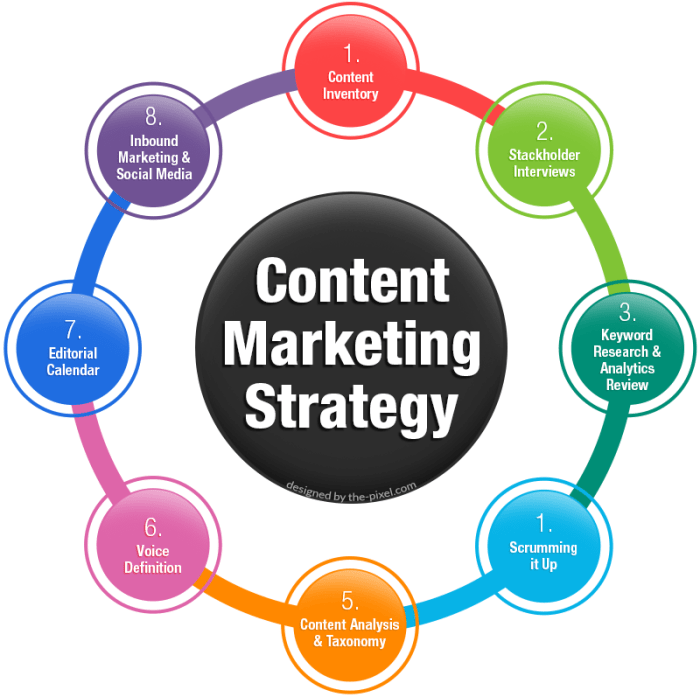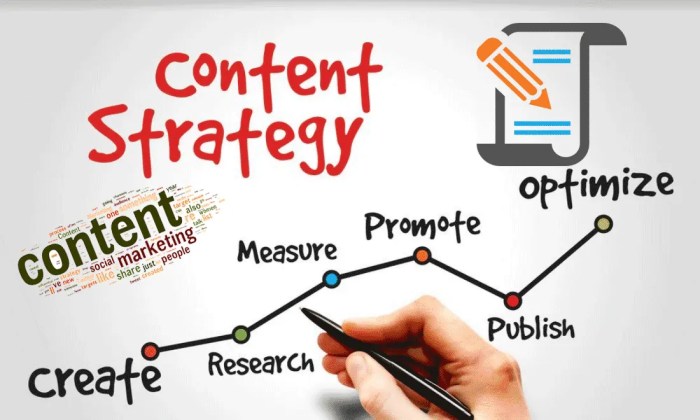Content Marketing Strategy is the driving force behind successful businesses, shaping brand identity and boosting customer engagement. Dive into the world of strategic content creation and distribution with a fresh perspective that resonates with the high school hip crowd.
Importance of Content Marketing Strategy

Having a well-defined content marketing strategy is crucial for businesses in today’s digital landscape. It helps companies stand out from the competition, connect with their target audience, and drive meaningful results.
Successful Examples
- Red Bull: By creating engaging content around extreme sports and adventure, Red Bull has built a strong brand presence and loyal following.
- HubSpot: Through their comprehensive blog, webinars, and guides, HubSpot has established itself as a thought leader in the marketing industry.
Brand Building and Customer Engagement
A content marketing strategy plays a key role in brand building by shaping a company’s identity and values through consistent messaging. By creating valuable content that resonates with their audience, businesses can foster trust and loyalty among customers.
Impact on Lead Generation and Conversion Rates
A well-crafted content marketing strategy can significantly impact lead generation and conversion rates. By providing informative and relevant content at different stages of the buyer’s journey, businesses can attract leads, nurture them, and ultimately convert them into customers.
Components of an Effective Content Marketing Strategy
To create a successful content marketing strategy, there are key elements that should be included to ensure your efforts are targeted and impactful.
Role of Target Audience Analysis
Understanding your target audience is crucial in developing a content marketing strategy. By conducting thorough analysis, you can identify demographics, preferences, behaviors, and pain points of your audience. This information helps in creating content that resonates with them, increasing engagement and conversions.
Significance of Setting Clear Goals and KPIs
Setting clear goals and Key Performance Indicators (KPIs) is essential for measuring the success of your content marketing strategy. Whether it’s increasing brand awareness, driving website traffic, or generating leads, having specific goals allows you to track progress and make data-driven decisions to optimize your strategy.
Content Planning and Creation
Content planning and creation are integral parts of a comprehensive content marketing strategy. Developing a content calendar, brainstorming topics, creating valuable and engaging content, and optimizing for are all important aspects to ensure consistent delivery of content that aligns with your goals and resonates with your target audience.
Content Distribution Channels: Content Marketing Strategy

In a content marketing strategy, choosing the right distribution channels is crucial to reach the target audience effectively and maximize the impact of the content. Different channels like social media, email, blogs, and offer unique opportunities to connect with users and drive engagement.
Social Media
Social media platforms like Facebook, Instagram, Twitter, and LinkedIn are powerful tools for distributing content to a wide audience. They allow for direct interaction with users, sharing of content, and building brand awareness. Each platform caters to different demographics, so it’s essential to choose the right ones based on the target audience.
Email Marketing, Content Marketing Strategy
Email remains one of the most effective channels for content distribution, offering a personalized approach to engage with subscribers. By sending targeted content directly to their inboxes, brands can nurture leads, promote products, and drive conversions. It’s crucial to segment the email list and tailor the content to the interests of each group.
Blogging
Blogs are a great way to showcase expertise, provide valuable information, and drive organic traffic to the website. By creating high-quality, -optimized content, brands can attract and engage readers, establish thought leadership, and improve search engine rankings. It’s essential to maintain a consistent posting schedule and promote blog posts across other channels.
Search Engine Optimization ()
plays a vital role in content distribution by making the website more visible to users searching for relevant information. By optimizing content with targeted s, meta tags, and quality backlinks, brands can improve their search engine rankings and attract organic traffic. It’s essential to stay updated with best practices and continuously optimize the content for search engines.
Repurposing Content
Repurposing content involves adapting existing content into different formats to reach a broader audience across various channels. For example, a blog post can be repurposed into social media posts, videos, infographics, or podcasts. This strategy allows brands to maximize the value of their content, increase visibility, and engage users in different ways.
Measuring Success in Content Marketing
In the world of content marketing, it’s crucial to measure the success of your strategies to ensure you’re on the right track. By identifying key metrics and utilizing the right tools, businesses can evaluate the performance of their content and make necessary adjustments for better results.
Key Metrics and Tools
When it comes to measuring success in content marketing, there are several key metrics to consider. These include:
- Website traffic: Monitoring the number of visitors to your site can indicate the effectiveness of your content in driving traffic.
- Engagement metrics: Tracking metrics like bounce rate, time on page, and social shares can show how engaged your audience is with your content.
- Conversion rates: Analyzing how many visitors take desired actions after consuming your content can help determine the impact of your strategy.
Tools like Google Analytics, SEMrush, and HubSpot can provide valuable insights into these metrics and help track the success of your content marketing efforts.
Importance of Data Analysis
Data analysis plays a crucial role in evaluating content marketing performance as it allows businesses to make data-driven decisions. By analyzing the gathered data, companies can identify trends, patterns, and areas for improvement in their content strategy.
Tracking ROI and Performance Indicators
Businesses can track ROI and performance indicators related to content marketing by setting clear goals, monitoring KPIs, and using tools like CRM systems to track leads and conversions. By determining the ROI of their content efforts, companies can assess the effectiveness of their strategy and make informed decisions.
A/B Testing and Experimentation
A/B testing and experimentation are essential in optimizing content marketing strategies. By testing different variations of content, businesses can identify what resonates best with their audience and refine their approach for better results. Experimentation allows companies to continuously improve their content strategy based on data-driven insights.